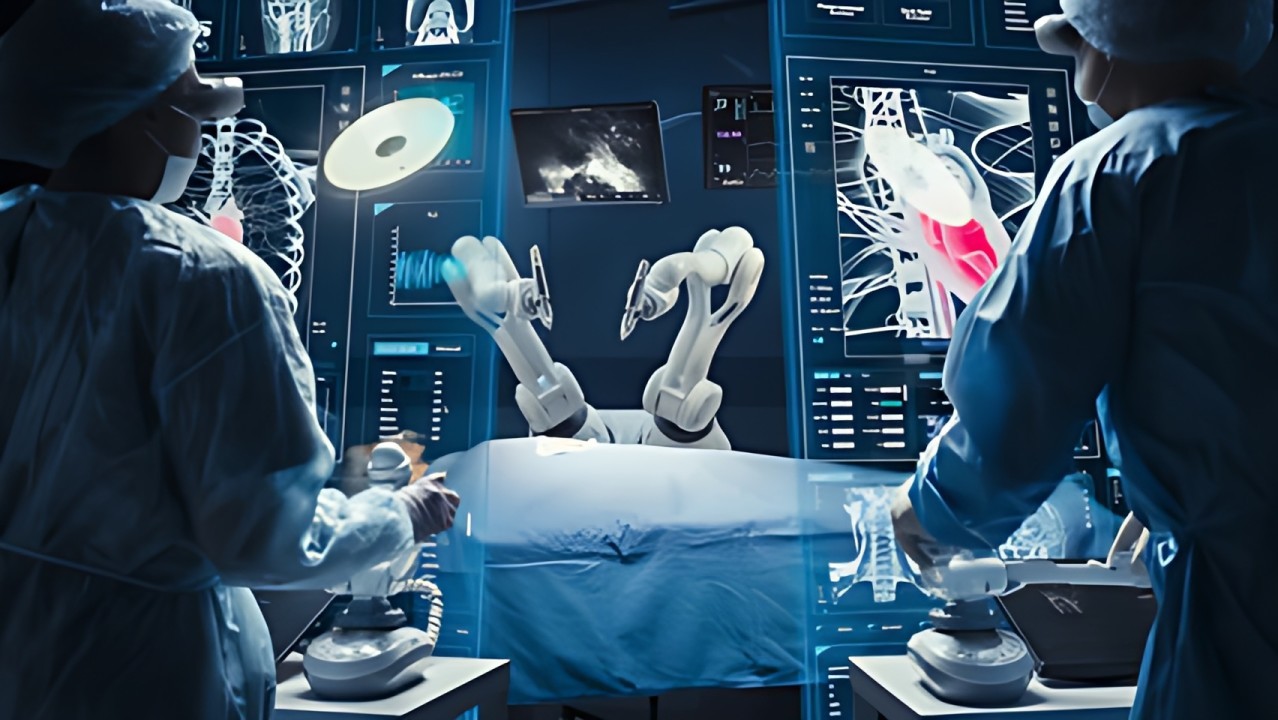The Evolution of Surgical Precision: Integrating AI in Operating Rooms
Surgical precision has always been a critical aspect of successful surgeries, and the integration of AI in operating rooms marks a significant milestone in the evolution of healthcare. AI integration is revolutionizing surgical procedures by enhancing accuracy, reducing human error, and improving patient outcomes. As healthcare evolves, the adoption of AI technologies in operating rooms is paving the way for a new era of surgical precision, where every incision is guided by data-driven insights and cutting-edge technology. This blog explores the evolution of surgical precision through AI integration in operating rooms, highlighting the transformative impact of this technological advancement on modern healthcare.
The Role of AI Integration in Enhancing Surgical Precision
AI integration in operating rooms has significantly enhanced surgical precision by providing surgeons with real-time data, predictive analytics, and advanced imaging capabilities. These technologies allow for more accurate planning, execution, and monitoring of surgical procedures, minimizing risks and improving outcomes. The integration of AI in operating rooms represents a significant leap forward in healthcare evolution, where technology plays a crucial role in enhancing the capabilities of medical professionals.
Key Benefits of AI Integration in Surgical Precision:
- Real-Time Data Analysis: AI-powered systems analyze data in real-time, providing surgeons with critical insights during procedures. This allows for adjustments on the fly, enhancing surgical precision and reducing the likelihood of complications.
- Advanced Imaging Techniques: AI integration enables the use of advanced imaging techniques, such as 3D modeling and augmented reality, to guide surgeons with unparalleled accuracy. These tools help in visualizing complex anatomical structures, ensuring that every movement is precise.
- Predictive Analytics: AI systems can predict potential complications by analyzing patient data, including Medical History. This allows surgeons to anticipate challenges and plan accordingly, further improving surgical precision.
How AI Integration Is Transforming Operating Rooms
The integration of AI in operating rooms is transforming the way surgeries are performed, leading to a new standard of care. AI-driven technologies are not only enhancing surgical precision but also optimizing workflows, reducing the workload on surgical teams, and improving patient safety. As operating rooms become more technologically advanced, AI integration is playing a pivotal role in healthcare evolution.
Innovations in AI-Integrated Operating Rooms:
- Robotic-Assisted Surgery: AI integration in robotic-assisted surgery allows for greater precision and control. Surgeons can perform complex procedures with minimal invasiveness, leading to faster recovery times and reduced risk of complications.
- AI-Driven Decision Support Systems: These systems provide surgeons with real-time recommendations based on data analysis, helping them make informed decisions during surgery. This enhances the accuracy and effectiveness of surgical procedures.
- Enhanced Patient Monitoring: AI integration allows for continuous monitoring of patient vitals during surgery, ensuring that any anomalies are detected and addressed promptly. This real-time monitoring contributes to overall surgical precision and patient safety.
The Impact of AI on Healthcare Evolution
AI integration in operating rooms is a key driver of healthcare evolution, bringing about significant changes in how surgeries are planned, executed, and monitored. The adoption of AI technologies is leading to more personalized, efficient, and precise surgical care, ultimately transforming the landscape of modern healthcare.
The Evolutionary Impact of AI on Healthcare:

- Personalized Surgical Care: AI-driven systems can analyze a patient’s Medical History, genetic data, and other relevant information to create personalized surgical plans. This ensures that each procedure is tailored to the specific needs of the patient, enhancing surgical precision and outcomes.
- Increased Efficiency: AI integration optimizes surgical workflows by automating routine tasks and providing decision support, allowing surgical teams to focus on more critical aspects of the procedure. This increased efficiency is a hallmark of healthcare evolution.
- Improved Patient Outcomes: By enhancing surgical precision and reducing the risk of complications, AI integration leads to better patient outcomes. This is a significant step forward in the evolution of healthcare, where technology is leveraged to improve the quality of care.
Challenges and Opportunities in AI Integration for Surgical Precision
While the integration of AI in operating rooms offers numerous benefits, there are also challenges that need to be addressed to fully realize its potential. These challenges include data security, the need for extensive training, and the integration of AI systems with existing healthcare infrastructure. However, these challenges also present opportunities for innovation and improvement in surgical precision.
Challenges in AI Integration:
- Data Security: The use of AI in operating rooms requires the collection and analysis of large amounts of patient data. Ensuring the security and privacy of this data is critical to maintaining patient trust and compliance with regulations.
- Training and Adoption: Surgeons and surgical teams need to be trained to use AI-integrated systems effectively. This requires a significant investment in education and training programs to ensure that healthcare professionals can fully leverage AI technologies.
- Integration with Existing Systems: Integrating AI technologies with existing healthcare infrastructure can be challenging, particularly in older facilities. Healthcare providers must ensure that AI systems are compatible with current equipment and processes.
Opportunities for Advancement:
- Development of New AI Technologies: The ongoing development of AI technologies presents opportunities to further enhance surgical precision. Innovations in AI-driven imaging, robotics, and decision support systems will continue to push the boundaries of what is possible in operating rooms.
- Collaboration Between AI Developers and Healthcare Providers: Collaboration between AI developers and healthcare providers is essential to ensure that AI technologies are designed to meet the specific needs of surgical teams. This collaboration can lead to the creation of more effective and user-friendly AI systems.
The Future of AI Integration in Operating Rooms
The future of AI integration in operating rooms is bright, with ongoing advancements promising to further enhance surgical precision and healthcare outcomes. As AI technologies continue to evolve, they will play an increasingly important role in the evolution of surgical care, leading to a new era of precision, efficiency, and patient safety.
Emerging Trends in AI Integration:
- AI-Driven Robotics: The future of surgical precision lies in AI-driven robotics, where machines can perform intricate procedures with greater accuracy and consistency than ever before. These advancements will revolutionize operating rooms and set new standards for surgical care.
- Real-Time Data Sharing and Collaboration: AI integration will enable real-time data sharing and collaboration between surgical teams, even across different locations. This will facilitate more comprehensive and coordinated care, enhancing the overall quality of surgical procedures.
- Continuous Learning and Improvement: AI systems will continue to learn and improve over time, adapting to new data and refining their capabilities. This continuous improvement will ensure that AI-driven surgical precision remains at the cutting edge of healthcare evolution.
Smart History AI’s AI Medical Chatbot is an innovative tool that efficiently handles Medical History Questions, offering real-time insights and personalized health advice. As a leading Software as a Medical Device (SaMD) solution, this AI-driven platform seamlessly integrates with healthcare systems, enhancing the precision and effectiveness of patient care.
Conclusion
The evolution of surgical precision through AI integration in operating rooms is a testament to the transformative power of technology in healthcare. As AI continues to evolve, it will play an increasingly vital role in enhancing surgical care, improving patient outcomes, and driving healthcare innovation. By embracing AI integration, healthcare providers can ensure that they remain at the forefront of surgical precision, delivering the highest quality care to their patients.









